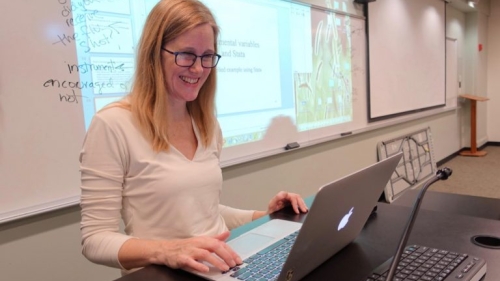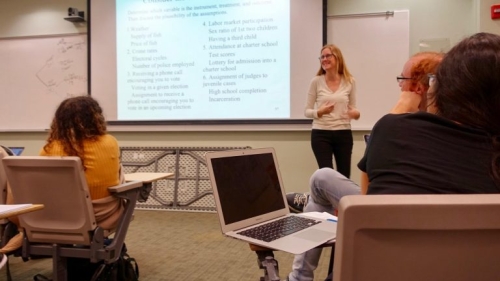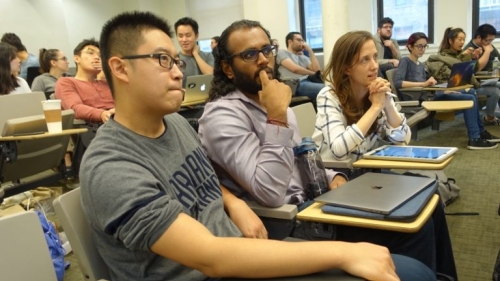
Professor Jennifer Hill teaches Causal Inference at NYU Steinhardt
In Jennifer Hill’s Causal Inference class, students learn how to use statistical methods to answer pressing research questions that arise across fields as diverse astransportation, psychology, education, marketing, and public health.

Students come from colleges and universities outside NYU to attend Professor Jennifer’s Hill’s Causal Inference class.
Causal Inference focuses on answering questions that take the form of ‘Did A cause B?” explains Hill, a professor of applied statistics and data science. “Those questions could range from figuring out whether a drug can cure cancer to understanding whether a Facebook post can change your political beliefs.”
Hill notes that most students have heard the phrase, “correlation is not causation,” but her class teaches students the why behind the theory and gives them tools to make progress in their own research.
For Hill’s students, progress might mean being able to design a study or use a statistical method that allows them to move from correlation to causation.
“Sometimes progress also means understanding that you simply don’t have enough data to answer a causal question,” Hill says.
Hill believes that the ability to understand when causal inference is possible, or not, is critical if one wants to be an effective and responsible scientist.

Student watch Professor Jennifer Hill work out a problem in Causal Inferences.
This semester, every seat in Hill’s class is taken. Offered through Steinhardt’s Department of Applied Statistics, Social Science, and the Humanities, Causal Inference attracts students from eight schools across NYU, as well as four universities that participate in the Inter-University Doctoral Consortium.
Hill has a reputation for being a great teacher. Alexandra Haralampoudis likes her passion and ability to make difficult material accessible. A doctoral student at Rutgers School of Social Work, Haralampoudis finds the class essential to her research on social welfare policies.
“I work with secondary data; data collected by someone else,” Haralampoudis said. “The Causal Inference class is useful as I try to make statistical adjustments to observational data to allow claims that are closer to causal.”
Nicolás Rojas, a doctoral student in economics and education at Columbia University, was encouraged by his professor and classmates to sign up for the class.
“For me, this is a unique opportunity to study with a professor who is widely regarded as an expert in her field,” he said.
On a recent Friday morning, students worked on an assignment designed to help them use instrumental variable analysis to uncover causal relationships in “natural” experiments.
Using prompts Hill provided, students broke each example into parts by identifying the instrument, the treatment, and the outcome. Then they discussed the underlying assumptions behind their choices.
During the assignment, there was a feeling of intimacy in the auditorium as students shared their work and Hill moved around the classroom listening and offering insight.
“Everyone I know who has taken this class agrees that the course is not only interesting and useful, but also incredibly fun,” Rojas said. “Jennifer challenges us to enjoy what we study in class. She teaches us not to be intimidated by causal inference.”
